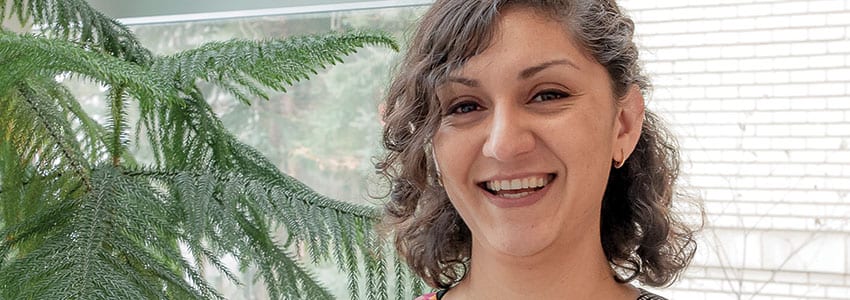Jacqueline has lived in France on and off for a few years and finds some interesting comparisons between Paris and Detroit. She notes, “In Paris, immigrants live on outskirts of the city, but in Detroit they concentrate in inner city landscapes. I try to incorporate these types of American and European contrasts in my teaching.”
In the last few years, she has taught Italian, German, and British history, political philosophy, English literature and industrialism. In her most innovative class, students compared Holocaust memorials in Berlin and Israel, exploring the experience visitors had at each site. She says, “Students connected with the two different countries and the ways both expressed different sentiments with the exact same moment.” She adds, “When I’m done, I hope to teach modern European history from 1789 to the present.”
Jacqueline researches how immigrant groups have been integrated into France. She is concerned with immigrants in a broad sense, including those who have French citizenship but are culturally and socially marginalized. She says, “This subject is relevant now, particularly in the last few months when Islamic groups have constructed to clash against nationalism in Paris. In reality, these issues go back more than 100 years, especially in light of colonialism. I’m trying to explore that relationship through researching newspapers, citizenship laws, and public records.”
Studying French history requires travel and summers offer an opportunity to spend concentrated time in the field to explore her dissertation subject. Jacqueline spent her first summer as a doctoral student in Paris researching how social legislation targeted foreign populations. She found that many of the documents on the subject continue to be classified, even after 60 years. The following summer, she returned to examine how Catholic missionaries affected social and immigration policies. She says, “It’s been a long stretch of piecing together 50 years of history. I stumbled upon a fantastic museum – the French Museum of Immigration in Paris. It holds a treasure trove of records, pictures, and archives from the French state, Spanish concentration camps, including Polish emigration histories up through those from Senegal and Algeria. It was fascinating to come across this documented collection. It shows the presence of immigrants and their status in society.”
Jacqueline plans to spend the next academic year in France conducting research for her dissertation. She explains, “I hope to intervene through social missionary work, public policy and citizenship laws. My ultimate goal is to find documents from groups themselves, working directly with disadvantaged community groups who are citizens but not treated as such.”
Her passion for teaching is a product of her childhood: Jacqueline was raised in a Spanish speaking household and became accustomed to translating. As she grew up, she was always assigned to coach other students and tutored in after-school programs. She says, “Students at all levels have the potential to grow or learn. Good teachers help students where they are now, where they want to go, and help them figure out how to achieve their goals”
As an undergrad at the University of California – Berkeley, she fell in love with French history through the mentoring of graduate students, Celine Piser and Karla Nielsen. When searching for a Graduate Program, Jacqueline says, “I wanted something new. I’m from Southern California, and it felt like it was time to try something different. I found Michigan to be a great environment that treated you like a person. I find having lived in different parts of the country that I’m attracted to places like this that have such a curiosity for learning. Here, I can go to any event and people talk about something with the intent to explore what it means, figure out how we can learn from it, and how to incorporate it into our work.”
She joined the Material Histories Rackham Interdisciplinary workgroup this year and finds that a perfect example, explaining, “This has been a fantastic experience. We are all reading a book that pertains to Africa, the U.S., and Russia. Ph.D. candidates from all over participate in the group, and this is a great chance to see how each approaches their work. I enjoy collaborating with fellow grad students, they have been a strong pillar of support.”
Jacqueline’s advisors also give her a strong sense of direction and support. “I feel strongly supported. I’ve had mentors every year and I’m always impressed by the high level of commitment faculty display. I’m grateful for the support given to me by faculty when I had health problems last year. When you have setbacks, you want to be sure you take care of your mind and body. I am thankful for the support to slow down and take the time I needed.” she says.
To relieve stress and decompress, Jacqueline is an active volunteer in her church community. Ever the teacher, she volunteers her language skills and time, teaching English as a second language to native Spanish speakers. She says, “It is a humbling experience.” At St. Mary’s Student Parish, she also volunteers with an adult initiation program for those who want to join the church. She laughs when she says she does physical therapy as a hobby, having torn part of her ACL playing squash with friends from the English and History departments last summer. She’s trying to learn to swim to help her physical therapy and is on her third set of lessons.
Jacqueline credits her parents with much of her success. She comments, “They instilled in me a good work ethic. They taught me how to approach learning, face setbacks, but most of all, to just keep working.”

